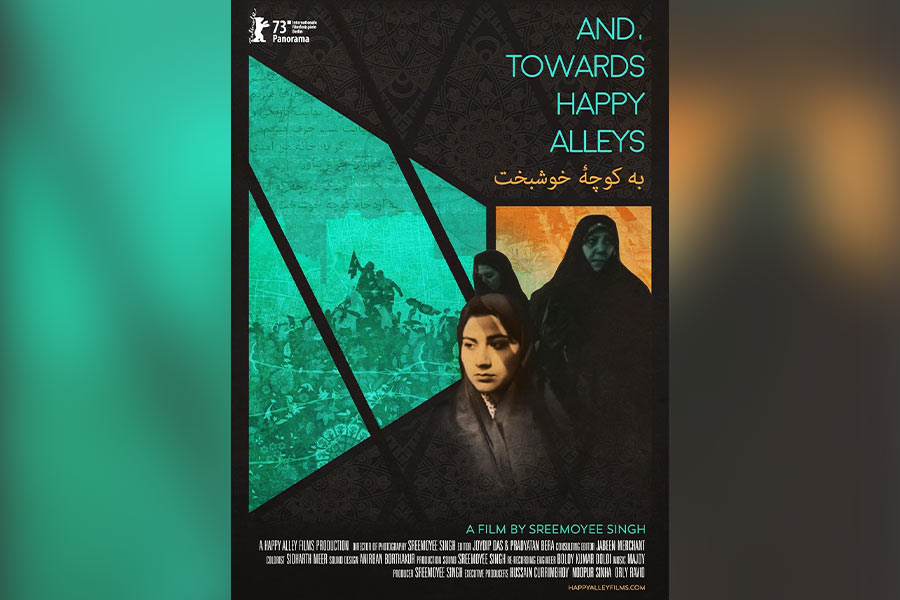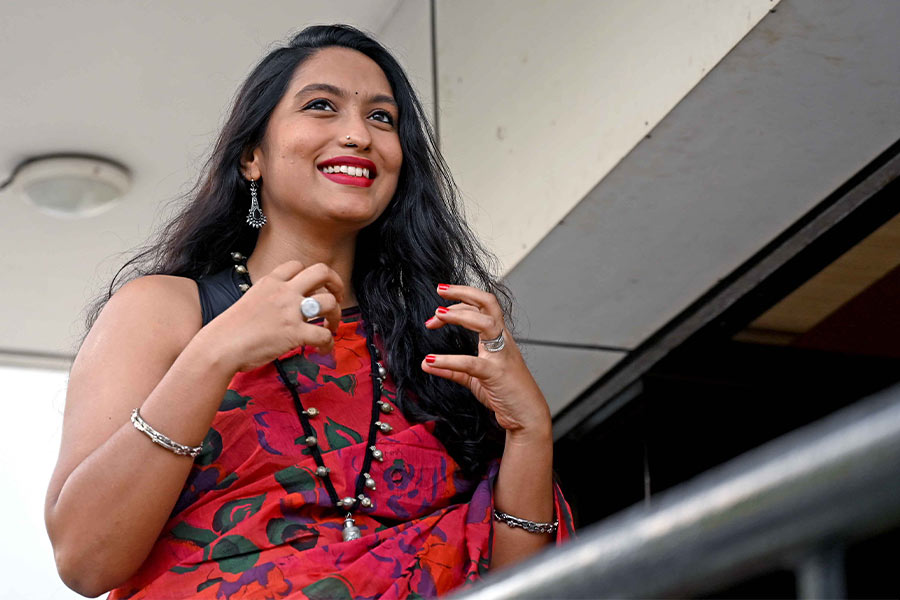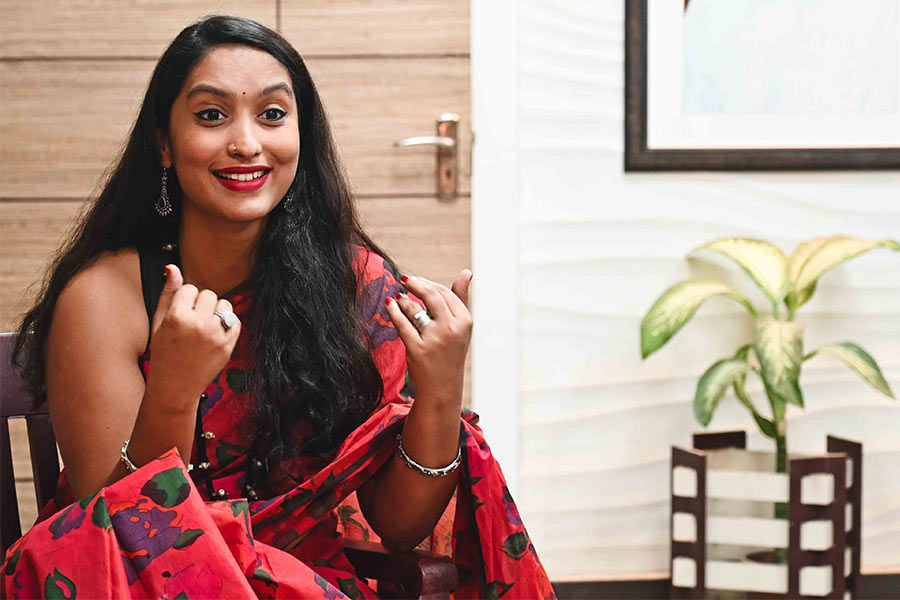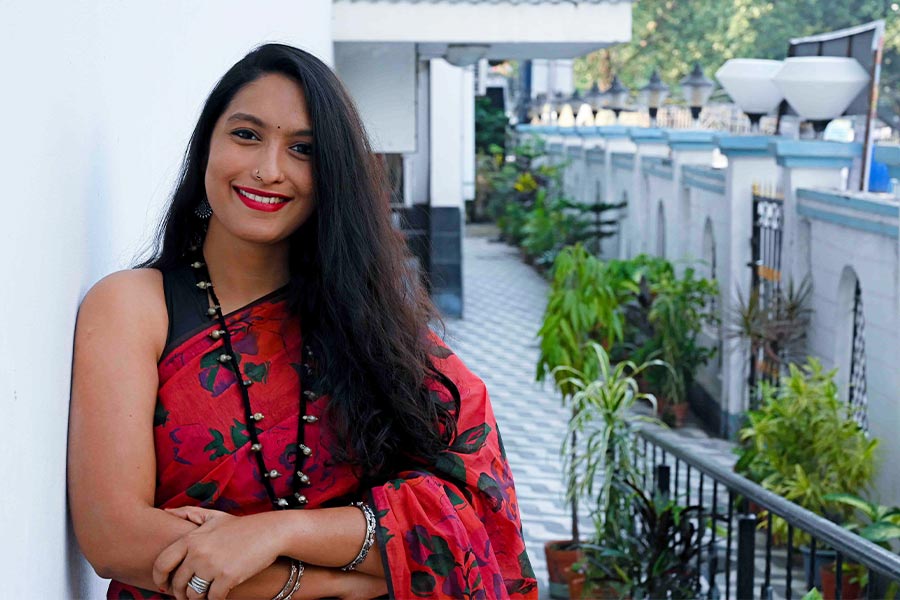Sreemoyee Singh’s love for cinema has Iranian films at its epicentre. Her formal education in Film Studies (MA and PhD) from Jadavpur University augmented this love and inspired Singh to create something entirely of her own. Her brainchild, And, Towards Happy Alleys is a testament of her fascination of the Iranian film culture, and the indomitable spirit of filmmakers like Jafar Panahi and Mohammad Shirvani to name a few, human rights activist Nasrin Soutodeh, who refuse to give up on their profession despite facing constant threats and ban from the dictatorial regime. Shot in the style of a personal docu-film over a span of seven years, Singh’s debut film premiered at Berlinale in 2023, and since then has travelled to more than 15 internationally acclaimed film festivals. After soaring high globally, Sremoyee is happy to finally bring her film back home. My Kolkata was in conversation with the filmmaker after her screening at KIFF during December 2023. Edited excerpts from the conversation…
My Kolkata: We would like to begin by asking the question that is on everyone’s minds: why is an Indian girl making a film on Iran?
Sreemoyee Singh: Why not? You cannot restrict empathy within borders. If something happening outside moves you, you should do something about it. Not every film by an Indian has to be about something in my country. I made a film about Iran and Iranian women because I could relate to their experiences, and I wanted to share my empathy with them and the world. Of course the film is set in Iran, but I felt that it was my story too.
What was it about Iranian new-wave cinema that drew you in?
Having grown up with distorted media portrayals of Iran, equating the people with the regime, I discovered the true essence of the country through New Wave films. They portrayed a humane side, countering stereotypes of religious extremism and victimisation. Inspired by Modern Persian poetry, the Iranian New Wave adopted a lyrical approach to filmmaking, circumventing blunt expression. Forugh, admired for her boundless expression, played a significant role in this influence. Essentially, it was Forugh’s poetry and watching the films of the Iranian New Wave that made me fall in love with this world. You can say, it was my ideal way of falling in love!
In Iran, would you say that the experiences of Sreemoyee as a person were different from those of Sreemoyee as a filmmaker?
I can’t separate the two, actually. I think me as a person and as a filmmaker are not two different things. And I think even in the film, I haven’t segregated it. This is my first film so I can’t really say great things about it (laughs), but I can say that I have done it with all the honesty that I had. It is my testimony of falling in love with Iranian cinema, and pursuing it. And I think this honesty could be only retained because there is no segregation between the filmmaker and the person. Even the voiceovers are taken from my journals that I used to keep in Iran. Very detailed, descriptive and dated entries about every major experience. So yes, I haven’t separated the two. The film is about my journey in Iran, and that is what I show.

The poster of the film
You mentioned your process of creating the voiceovers as part of your film narrative. Could you elaborate on this?
The first assembly was with inter-titles and written notes, instead of the voiceovers. And then we made a whole assembly, connecting it with thoughts, without the voiceover. And it didn’t work. It was too taxing. By then I had figured that the most effective way of conveying my sense of journey is through the voiceover: I am anyway there in the film, I am singing in the film, so why not use me? So then, the film took a very ‘verite’ language. Verite filmmaking is something where you feel the presence of the filmmaker (either in the camera movements, or through off-screen conversations, or you actually see the filmmaker) instead of observational filmmaking. In verite, you are there in the midst of everything; you are there in the space where the action is happening. You are not just filming, you are being filmed too. I found that my film was taking that turn. When my film took this turn, I realised that there is no other way out, the voiceover has to come in, and that it is going to be a very personal documentary.
Your film opens with a poem by Forugh Farrokhzad, from which you also derive the title of your film. What led to this decision?
And, Towards Happy Alleys is inspired by a powerful poem of Forugh. When I was showing the film in Berlin, a lot of Iranians came to see the film. Everyone told me that, “Thank you for not victimising or villainising us, as the world does outside; thank you for celebrating us and showing us the way we are.” I could do so because the Iran I experienced was a journey towards happy alleys – it is poetic. And when I found this poem in which Forugh writes that even though she is living in darkness, she has one window and one lamp. And that is enough for her to see the crowd in the happy alley. For so many years this country has been fighting for basic dignity, but what is unmistaken is the zest of resilience. The zeal to continue resisting. To steal their freedom out, no matter the circumstances you are living in.
Throughout the film, there is a lot of hope. Yes, there are heavy moments, but at the bleakest moments, you’ll laugh, too. There is this humour that runs through the film, along with hope. Hence, it is “And, Towards Happy Alleys”. We are not there yet, but there will be happy alleys. Which is why there is an ‘and’, which brings attention to the movement that we are about to go there.

‘You cannot restrict empathy within borders. If something happening outside moves you, you should do something about it,’ says Singh Amit Datta
Your film refers to two widely-acclaimed movies by Jafar Panahi: Taxi and Offside. In a way, you continued the dialogue on social issues that Panahi’s films had started. What spurred you to do this and why these particular movies?
I didn’t plan it. You see, the New Wave in Iran was heavily inspired by Neo Realism in Italy. There were massive cuts in budget, so filmmakers even started filming in the streets with non-actors, no artificial lights, no sets, etc. So when I went to Iran with my camera, it was obvious that my film would also be similar. When you go to a new country, things that are part of daily happenings in the country will figure a way to get into your narrative. That was the case with Offside, too. During my three-month trip to Iran in 2018, it coincided with the World Cup. I saw the two obvious dots – World Cup and Panahi – and had to join them! I simply went out with my camera, without even knowing that it would make it into my narrative. It’s just instinct, I guess.
Do you consider your film to be political in nature?
Yes. It is a political film, but the treatment is poetic. It is a personal documentary, so the treatment is personal and poetic. I am very interested in making films in this manner. I feel like you can only talk about issues that are affecting people so much through the personal lens.
The reception of your film at KIFF was phenomenal! What has your experience been like, with your film doing so exceptionally well in film festivals?
When I started making the film, I didn’t know anything about this business of making films. I’m still learning (laughs). When I was filming, I just hoped to finish it and show it to as many people as possible. I had never expected that I could show it in the way I could. That it would become a film picked by Berlinale, that it would travel so widely all across the world, it has been very fulfilling. KIFF is the 18th big festival my film has been screened at! Although my film cannot be shown in Iran right now, Berlin did something incredible for it. Because of Berlin’s huge Iranian diaspora, it opened up my film to a huge Iranian audience. In the Q&A session after my final screening at Berlin, someone asked me to sing a song (Soltane Ghalba) from my film. It was the least expected! I choked up a bit while singing, and then the entire hall started singing with me. It was a magical moment! Of course I wish for my film to be shown widely, but if an Iranian connects with the film and feels that it is their story told in a way that they can say “it’s my story”, that is the most important to me.

‘Although my film cannot be shown in Iran right now, Berlin did something incredible for it. Because of Berlin’s huge Iranian diaspora, it opened up my film to a huge Iranian audience,’ said Singh Amit Datta
There is a very beautiful blend of issues in your film: you have alternately talked about Iranian films as a whole, interspersed with issues of feminism in those films and poetry. How did you decide on this way of narration for your film?
This was very clear to me from the start. My two points of inspiration were Forugh and Iranian cinema, and for me Forugh was the emblem of feminism. Her poetry always spoke about this space of a woman where a woman could express herself. Most of her poems speak of missed opportunities: you wish you could express desire, but you cannot. So, through the thread of Forugh, I knew I could open it up to the rest of the film. This was also my reality: I could see that women are protesting for their daily rights. Being a woman, I had access to a lot of woman-centric spaces like buses, dormitories, etc. I had a lot of conversations with women. And I could easily join that with Forugh’s struggle: it’s a struggle that has been going on forever. Forugh spoke about this in the ’60s, and women are still fighting now, and this will go on. So this was one thread, and the other thread was about cinema. This is how the two threads came together in the film. And it is also structured in the form of a journey – my journey. How I remember my journey, and also the journey of the people I’ve met on the way.
In the future, do you think you’ll make further personal documentaries, or do you want to explore other genres of filmmaking too?
I have been singing all my life. I’ve been writing a lot, too. Cinema came much later to me. But it is important as it encompasses all my methods of expression. I hope I will be able to make films like this in future.
